

DN! “The End of America”: Feminist Social Critic Naomi Wolf Warns US in Slow Descent into Fascism. Restoring civil liberties, defending the Constitution, upholding the rule of law. BORDC (@BORDC) Interview - Naomi Wolf - The End of America. Sleeper cell Stalin. Naomi Wolf: Read Part Two of the Introduction to End of America. What follows is the second of two parts of the introduction to The End of America: Letter of Warning to a Young Patriot.
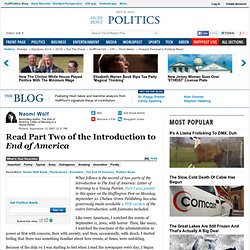
Part I was posted in this space on the Huffington Post on Monday, September 10. Chelsea Green Publishing has also generously made available a PDF version of the entire Introduction, with footnotes included. Like every American, I watched the events of September 11, 2001, with horror. Then, like many, I watched the reactions of the administration in power at first with concern, then with anxiety, and then, occasionally, with shock. I started feeling that there was something familiar about how events, at times, were unfolding.
Historical Echoes I began to think of these examples as "historical echoes" -- not proof that someone influential in the administration had studied the details of mid-twentieth-century fascism and totalitarianism, but certainly suggestive. These events may seem to have historical echoes because they actually are mirrored in history. When the U.S. Fighting the Fires of Hate. Joseph Goebbels. Paul Joseph Goebbels (German: [ˈɡœbəls] ( );[1] 29 October 1897 – 1 May 1945) was a German politician and Reich Minister of Propaganda in Nazi Germany from 1933 to 1945.
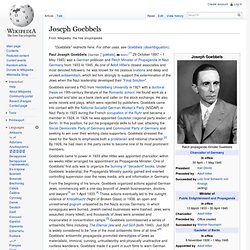
As one of Adolf Hitler's closest associates and most devoted followers, he was known for his zealous orations and deep and virulent antisemitism, which led him strongly to support the extermination of the Jews when the Nazi leadership developed their "Final Solution". Goebbels earned a PhD from Heidelberg University in 1921 with a doctoral thesis on 19th-century literature of the Romantic school. He found work as a journalist and later as a bank clerk and caller on the stock exchange. He also wrote novels and plays, which were rejected by publishers. Goebbels came to power in 1933 after Hitler was appointed chancellor; within six weeks Hitler arranged his appointment as Propaganda Minister.
During World War II, Goebbels increased his power and influence through adroit and shifting alliances with other Nazi leaders. Nazi book burnings. Book burning in Berlin, May 1933.
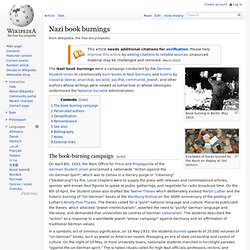
Examples of books burned by the Nazis on display at Yad Vashem. The Nazi book burnings were a campaign conducted by the German Student Union to ceremonially burn books in Nazi Germany and Austria by classical liberal, anarchist, socialist, pacifist, communist, Jewish, and other authors whose writings were viewed as subversive or whose ideologies undermined the National Socialist administration. The book-burning campaign[edit] On April 6th, 1933, the Main Office for Press and Propaganda of the German Student Union proclaimed a nationwide "Action against the Un-German Spirit", which was to climax in a literary purge or "cleansing" ("Säuberung") by fire. Local chapters were to supply the press with releases and commissioned articles, sponsor well-known Nazi figures to speak at public gatherings, and negotiate for radio broadcast time.
Triumph of the Will, wikipedia. Triumph of the Will (German: Triumph des Willens) is a 1935 film made by Leni Riefenstahl.
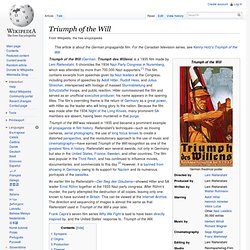
It chronicles the 1934 Nazi Party Congress in Nuremberg, which was attended by more than 700,000 Nazi supporters.[1] The film contains excerpts from speeches given by Nazi leaders at the Congress, including portions of speeches by Adolf Hitler, Rudolf Hess, and Julius Streicher, interspersed with footage of massed Sturmabteilung and Schutzstaffel troops, and public reaction.
Hitler commissioned the film and served as an unofficial executive producer; his name appears in the opening titles. The film's overriding theme is the return of Germany as a great power, with Hitler as the leader who will bring glory to the nation. Homeland, wikipedia. "Native land" redirects here.
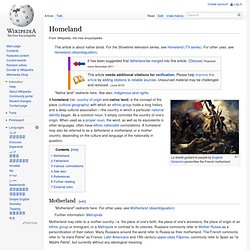
See also: Indigenous land rights. La liberté guidant le peuple by Eugène Delacroix personifies the French motherland A homeland (rel. country of origin and native land) is the concept of the place (cultural geography) with which an ethnic group holds a long history and a deep cultural association —the country in which a particular national identity began. As a common noun, it simply connotes the country of one's origin.
Enabling Act of 1933, wikipedia. Hitler's Reichstag speech promoting the bill The Enabling Act ( German : Ermächtigungsgesetz ) was a 1933 constitutional amendment that played a critical role in the rise of Adolf Hitler to become the dictator and Führer of Nazi Germany by August, 1934.
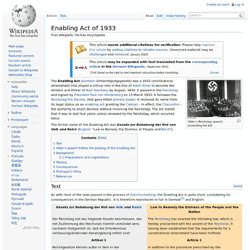
It passed in the Reichstag and signed by President Paul von Hindenburg on 23 March 1933. It followed the Reichstag Fire Decree , that gave Hitler plenary power . End of America A movie you must see to believe YouTube 1. Military Commissions Act of 2009. The Military Commissions Act of 2009, which amended the Military Commissions Act of 2006, was passed to address concerns by the United States Supreme Court.[1] In Boumediene v.
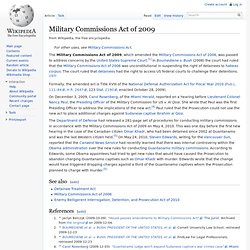
Bush (2008) the court had ruled that the Military Commissions Act of 2006 was unconstitutional in suspending the right of detainees to habeas corpus. The court ruled that detainees had the right to access US federal courts to challenge their detentions.[2][3] Formally, the amended act is Title XVIII of the National Defense Authorization Act for Fiscal Year 2010 (Pub.L. 111–84, H.R. 2647, 123 Stat. 2190, enacted October 28, 2009). Bifrucating laws, linch pins. The End of Civilizations. Transitions to Totalitarism.